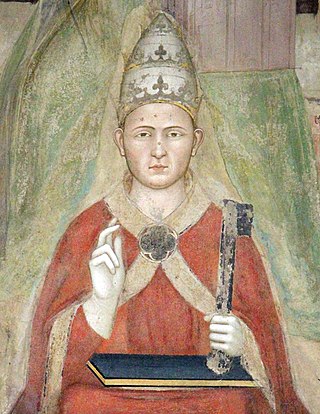
Pope Clement V, born Raymond Bertrand de Got, was head of the Catholic Church and ruler of the Papal States from 5 June 1305 to his death, in April 1314. He is remembered for suppressing the order of the Knights Templar and allowing the execution of many of its members. A Frenchman by birth, Clement moved the Papacy from Rome to Avignon, ushering in the period known as the Avignon Papacy.
William de Corbeil or William of Corbeil was a medieval Archbishop of Canterbury. Very little is known of William's early life or his family, except that he was born at Corbeil, south-east of Paris, and that he had two brothers. Educated as a theologian, he taught briefly before serving the bishops of Durham and London as a clerk and subsequently becoming an Augustinian canon. William was elected to the See of Canterbury as a compromise candidate in 1123, the first canon to become an English archbishop. He succeeded Ralph d'Escures who had employed him as a chaplain.
Ralph d'Escures was a medieval abbot of Séez, bishop of Rochester, and then archbishop of Canterbury. He studied at the school at the Abbey of Bec. In 1079 he entered the abbey of St Martin at Séez and became abbot there in 1091. He was a friend of both Archbishop Anselm of Canterbury and Bishop Gundulf of Rochester, whose see, or bishopric, he took over on Gundulf's death.
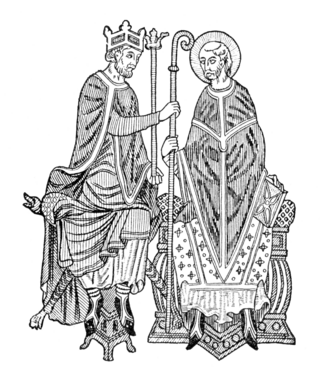
The Investiture Controversy or Investiture Contest was a conflict between the Church and the state in medieval Europe over the ability to choose and install bishops (investiture) and abbots of monasteries and the pope himself. A series of popes in the 11th and 12th centuries undercut the power of the Holy Roman Emperor and other European monarchies, and the controversy led to nearly 50 years of conflict.
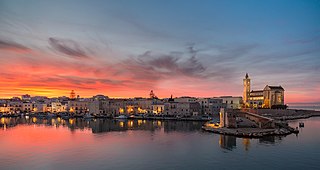
Trani is a seaport of Apulia, Southern Italy, on the Adriatic Sea, 40 kilometres (25 mi) by railway west-northwest of Bari. It is one of the capital cities of the province of Barletta-Andria-Trani.

Reginald Fitz Jocelin was a medieval Bishop of Bath and an Archbishop of Canterbury-elect in England. A member of an Anglo-Norman noble family, he was the son of a bishop, and was educated in Italy. He was a household clerk for Thomas Becket, but by 1167 he was serving King Henry II of England. He was also a favourite of King Louis VII of France, who had him appointed abbot of the Abbey of Corbeil. After Reginald angered Becket while attempting to help negotiate a settlement between Becket and the king, Becket called him "that offspring of fornication, that enemy to the peace of the Church, that traitor." When he was elected as a bishop, the election was challenged by King Henry's eldest son, Henry the Young King, and Reginald was forced to go to Rome to be confirmed by Pope Alexander III. He attended the Third Lateran Council in 1179, and spent much of his time administering his diocese. He was elected Archbishop of Canterbury in 1191, but died before he could be installed.

Pilgrim was a statesman and prelate of the Holy Roman Empire. In 1016 he took charge of the chancery of the Kingdom of Italy, and became the first archchancellor in 1031. In 1021 he became Archbishop of Cologne. For his part in the imperial campaign against the South Italian principalities in 1022, the chronicler Amatus of Montecassino described him as "warlike".
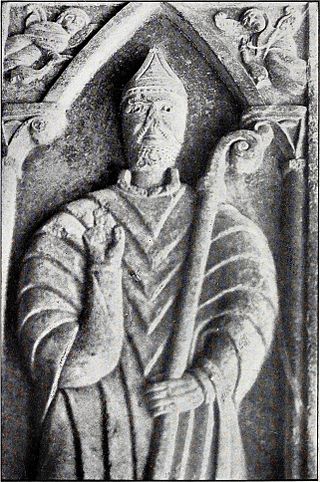
Bartholomew of Exeter was a medieval Bishop of Exeter. He came from Normandy and after being a clerk of the Archbishop of Canterbury, was made Archdeacon of Exeter in 1155. He became Bishop of Exeter in 1161. Known for his knowledge of canon law, he was involved in the Becket controversy after the appointment of Thomas Becket as Archbishop of Canterbury. After Becket's death, although he was frequently at the royal court, he mainly attended to his diocese. A number of works by him survive, including sermons and treatises on law and theology.

The Archdiocese of Trani-Barletta-Bisceglie is a Latin Church ecclesiastical territory or archdiocese of the Catholic Church in Italy in the province of Barletta-Andria-Trani in Apulia. Formerly a metropolitan see, in 1980 it became a suffragan archdiocese in the ecclesiastical province of the metropolitan Archdiocese of Bari-Bitonto. It received its current name in 1986, when the Archdiocese of Trani added to its title the names of two suppressed dioceses merged into it.

The Diocese of Oria is a Latin diocese of the Catholic Church in Apulia. It is a suffragan of the Archdiocese of Taranto.

Henry VI, a member of the Hohenstaufen dynasty, was King of Germany from 1169 and Holy Roman Emperor from 1191 until his death. From 1194 he was also King of Sicily as the husband and co-ruler of Queen Constance I.

Henry V was King of Germany and Holy Roman Emperor, as the fourth and last ruler of the Salian dynasty. He was made co-ruler by his father, Henry IV, in 1098.
Matthew was the Archbishop of Capua from 1183, when he succeeded Alfanus of Camerota. He supported the claim to the Sicilian kingdom of Constance and her husband, the Emperor Henry VI, against that of the reigning monarch, Tancred of Lecce. Under Henry, he became a royal advisor and imperial familiaris (courtier) at the court in Palermo. After the cities of Aversa and Capua briefly rebelled against Tancred in 1191, it was probably Matthew who persuaded them to surrender without a fight to Henry. In 1198 Constance placed the Jewry of Capua, thitherto under royal protection, under the protection of the archbishop as a reward for Matthew's loyalty. He was also praised by Henry's panegyrist, Peter of Eboli, in his Liber ad honorem Augusti.
Roger of San Severino was the Archbishop of Benevento from 1179 until his death. He was probably a younger brother of Count William of San Severino, the most powerful lord in the Cilento and a royal justiciar. He may also have been a cousin of Count Robert of Caserta. He was a monk at Montecassino before becoming bishop at a young age. His high aristocratic lineage and monastic vows were both unusual for bishops of southern Italy at the time. He was appointed archbishop of Benevento and cardinal-priest of Sant'Eusebio by Pope Alexander III.
Bertrand II was the Archbishop of Trani from 1157 until his death. In 1167 he was sent to Constantinople to arrange a marriage alliance for William II with the Byzantine Empire. He also exposed a conspiracy by Maio of Bari to kill Robert of San Giovanni. His successor was Samarus.

Conrad I [of Abenberg] was Archbishop of Salzburg, Austria, in the first half of the 12th century.
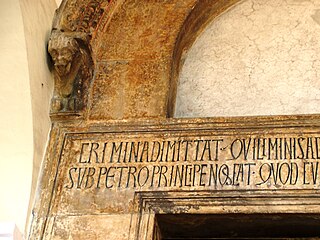
Robert was a south Italian nobleman who ruled the counties of Airola, Alife, Caiazzo, Sant'Agata and Telese from 1088 until his death. He was the regent of Capua in 1090–93, and was effectively independent of any lord after 1105. He was a major patron of churches and abbeys, and also commissioned several books.
Atenulf was the Abbot of Montecassino from 1011 until his death. He was a cousin of Prince Pandulf II of Capua, a younger son of Prince Pandulf III and brother of Prince Pandulf IV.
Amicus of Giovinazzo, also Amicus II, was a Norman nobleman and military leader during the Norman conquest of southern Italy. He was the count of Molfetta from 1068 until his death and of Giovinazzo from 1068 until 1073. He came from a prominent family often opposed to the rule of the Hautevilles. In 1067–68, 1072–73 and 1079–80 he took part in rebellions against the Hauteville Duke of Apulia. In 1067 and 1079 he received aid from Byzantium against the duke.
Enrico da Settala, sometimes anglicized Henry of Settala, was the archbishop of Milan from 1213 until his death.











